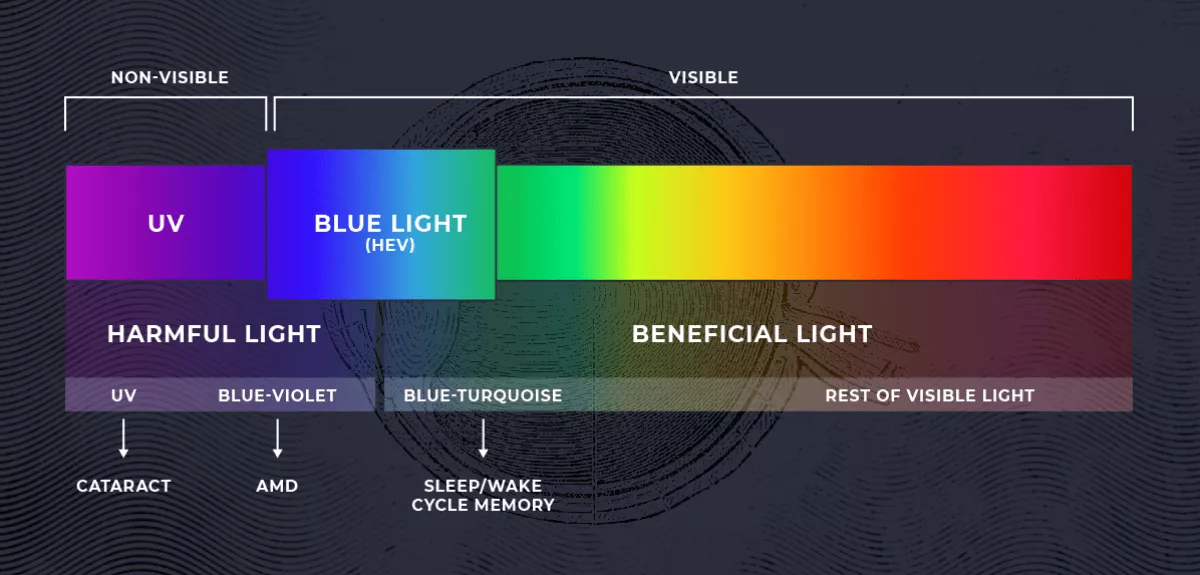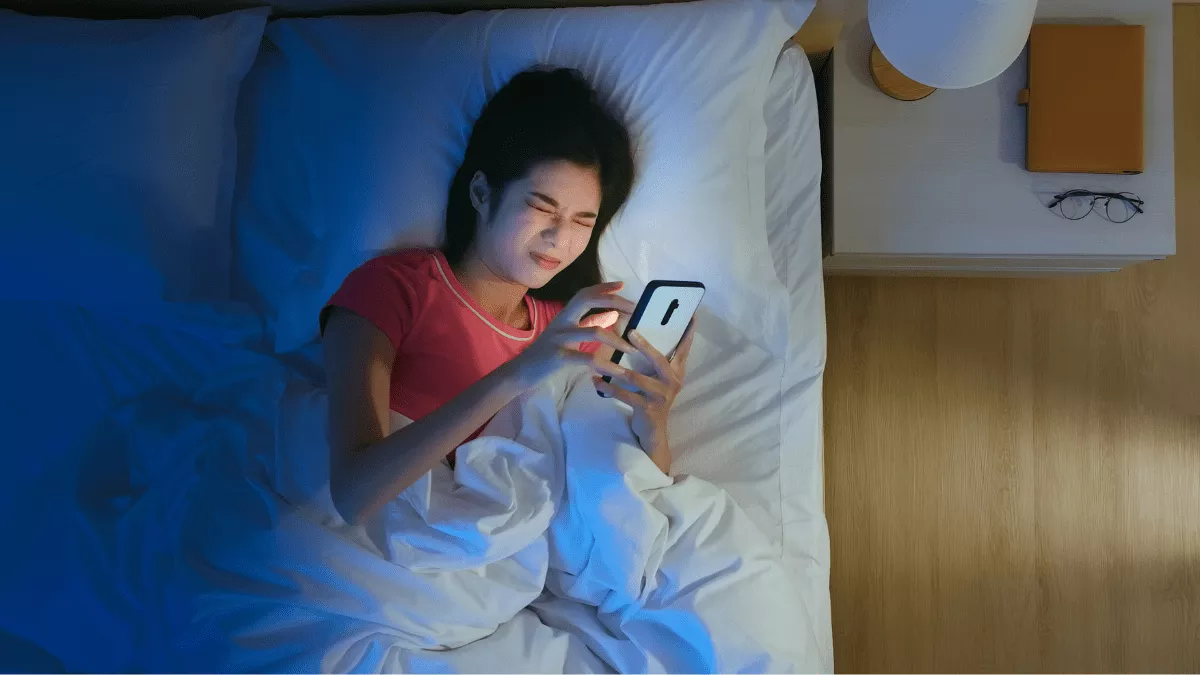I don’t know about you but I spend hours – HOURS – behind a screen every single day. From laptop to phone screen, it feels like a constant assault on my eyeballs.
After years of punishing my poor optic nerves, I finally invested in blue light glasses this year. And holy moly. What a difference it’s made. I have fewer headaches. I sleep miles better. Most important of all, I finally get to wear glasses for a reason and live out my smart girl fantasy.
My personal experiences aside, this article is all about the cold hard facts about blue light glasses.
Do blue light glasses actually work? Is blue light a problem for us anyway? Are blue light glasses the magic pill that the internet claims it to be?
Stick with me – I shall reveal all.
The light spectrum is pretty broad. We have invisible light like UV rays and visible light that we can detect with our flawed human eyeballs. Blue light is on the visible light spectrum. It has the shortest wavelength and therefore the highest energy at around 380-500 nanometers.

You can say that blue light is the most hyperactive of all the types of light we encounter in our everyday lives.
The sun is the main source of blue light for us. You also encounter it in copious amounts via fluorescent light bulbs, computer screens, smartphones, tablets, TVs etc.
If you’re reading this, you’ve probably read all of the terrible things about blue light.
“Your screens are killing your brain!”
That’s not entirely true. Blue light is fantastic at maintaining your alertness and boosting your mood. It’s quite a friendly addictive light to have around.
But you can have too much of a good thing. Long-term exposure of blue light can degrade your retinal epithelial cells. Essentially, since blue light is so hyper, it tires out your eyes over prolonged periods of time.
Blue light is also a key component for regulating your circadian rhythm. So too much blue light exposure at night may keep you awake for longer. This affects your sleep patterns and ability to fall asleep peacefully.
Enter blue light glasses. Seemingly, these magical things shield against too much blue light by way of a filter coating the glass of the lenses. The idea is that the filter prevents too much blue light getting absorbed by your retinas and diminishes the adverse effects that can cause.
In honesty, the data is quite mixed when it comes to how effective blue light glasses are.
For example, as yet, there’s little evidence to support the use of blue light glasses as a way to prevent eye strain. There is more evidence to support the idea that your eyes are straining because of what you’re doing on your computer, rather than the light emitting from it.
However, there is pretty good evidence that blue light glasses can improve your sleep. They are safe to wear all day but are particularly useful in the evenings for sleep reasons.

Blue light triggers your circadian rhythm. Circadian rhythm is just a fancy term for your 24-hour sleep-wake cycle. It’s managed by your trusty endocrine system that produces the right hormones at the right time.
Your eyes receive blue light as information. They send a signal to the brain to keep us awake and alert. So a grand dose of blue light first thing in the morning is actually quite wonderful if you’re an aspiring morning person (I’ve written all about that here!)
When night falls, your brain triggers the release of melatonin, the sleep hormone. Your body then naturally prepares for bed.
This divine dance between alertness and sleepiness is distrubed when you have your devices blaring blue light in your face all day. Blue light glasses can shield you from some of the light keeping you too alert for too long.
The Independent reported in a 2020 article that the average British adult spends almost 5000 hours staring at a screen. That guesstimates that the average adult will spend 34 years looking at screens in their lifetime.
Let that sink in. It’s terrifying.
Similarly, US adults spend around 12 hours a day on their TVs, phones and computers.
Because our devices cause so much aggro on our brains, it’s worth learning to live with them rather than avoiding them. The unfortunate fact is most of us rely on our devices to operate. Blue light glasses can make those extended work hours in front of screens a little easier for us to handle long-term.
So admittedly, the research on blue light glasses and eye strain is quite weak. So why then are so many people, such as myself, raving about how blue light glasses saved their sanity?
By virtue of sleeping better, you will naturally be less prone to migraines and headaches.
Another hypothesis is the placebo effect. You expect blue light glasses to help you and so they do.
And you know what? I love the placebo effect!
If something is working for you, does it really matter how?
I know that when I use blue light glasses, I have far fewer headaches over the course of long projects. If you’re a regular sufferer of digital fatigue, giving blue light glasses a try can’t hurt you.
Want a more comfortable workspace?
From ergonomic desks to creating ‘reach zones’, check out our guide here on how to make your workspace more comfy and conducive.
To find the right pair of blue light glasses for you, there are a couple of factors to consider.
I hope this was a balanced view of the powers of blue light glasses. If you get a high quality pair, you can dramatically improve your sleep and digital wellbeing.
To further boost your efforts, here are some final top tips:
We hope this article helped you get to know the truth about blue light and what blue light glasses can and can’t do for you!
Yes and no. The science is a little wonky when it comes to blue light glasses. It’s also been mentioned that the quality of blue light glasses vary widely because the manufacturing process isn’t standardized. You need to do thorough research to ensure you’re getting a good pair.
Computer vision syndrome is another term for digital eye strain. Symptoms include:
It depends! Blue light blocking glasses can be useful for those who stare at their screens for many hours like tech employees and entrepreneurs. That said, you can get the same effects by implementing good digital wellbeing techniques. For example, using the color filter on your phone screen or taking regular breaks to prevent eye strain. Consider blue light glasses an extra tool in your digital wellbeing toolkit.
Yes you can. There’s no harm in wearing blue light glasses for long periods of time. However, it’s not necessary to wear blue light glasses all day. Evenings are the prime time to wear them.
You only need a prescription for blue light glasses if you typically wear prescription glasses on a daily basis. You want to purchase a pair of blue light glasses that carry the same prescription as your daily spectacles.
Olivia De Santos is a freelance writer, wedding planner and entrepreneur from London, UK. She's a world traveller, wordsmith, film buff, mental health advocate and shea butter enthusiast.